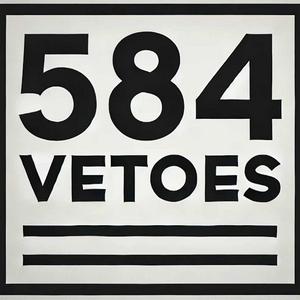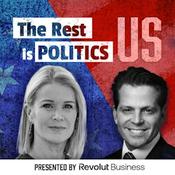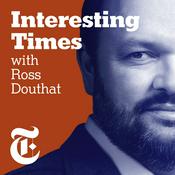Dostępne odcinki
5 z 8
- The Good, The Bad, and The Missing from the One Big Beautiful Budget BillHowdy folks. Congress is barreling toward a “one-big-beautiful” reconciliation bill, so Danny and I go through the good, the bad, and the missing from the House and Senate versions. President Trump swears no one is leaving D.C. until the bill is done by July 4. We just want to know how to plan our tax bills for the year.The House voted to keep nearly all of the 2017 Tax Cuts and Jobs Act in place, sprinkled in some spending cuts to Medicaid, and shipped H.R. 1 to the upper chamber. The Senate promptly ripped out every HSA tweak, sweetened the pot with permanent full expensing for business investment, and punted the rest back across the rotunda. Meanwhile the CBO’s dynamic score says the package raises debt more once growth and higher interest rates are both tallied, meaning it doesn’t come close to paying for itself.What looks good?* Medicaid provider-tax cap: the House’s 6 % limit and the Senate’s tougher 3.5 % version would finally crack down on states’ favorite Medicaid gimmick.* Full expensing: letting firms deduct new equipment upfront is one of the few truly pro-growth ideas.* HSA/ACA fix & direct-primary-care clause in the House version: solves a regulatory glitch so exchange customers with sky-high deductibles can finally open HSAs, and lets everyone use HSA dollars for a DPC membership.What doesn’t?“No tax on tips,” “no tax on overtime,” and a grab-bag of new credits look great in press releases but blow holes in the base and lead to marginal-rate cliffs.We also talk about the “16 million people will lose coverage” estimate going around. Roughly 5 million are able-bodied adults who would rather skip 80 hours a month of job-search or training, another 1½ million are undocumented enrollees that some states currently finance, and the rest fail new eligibility or verification checks. That’s a far cry from mass expulsions of vulnerable patients.What’s missing?We discuss a handful of Medicare changes that are omitted but will need to be addressed eventually.* Medicare site-neutral payments.* Medicare Advantage “up-coding” reforms and a bigger bite of Part B & D premiums for high-earners.* Small but important changes to federal-worker pension contributions, SNAP sanity checks, and other small entitlements that quietly add up.Veto of the Week: Grover Cleveland’s 1886 smack-down of a special pension boost for Civil War veteran John Taylor, because not every benefit needs an increase. A neat parallel to today’s senior programs that have quietly become very generous.What’s in the Episode[02:06] - House vs. Senate: Key Differences in the Bill[05:59] - Economic Implications of Tax Cuts[09:56] - Spending Cuts and Medicaid Reforms[12:48] - Medicaid Provider Tax Cap[19:30] - How Many People Will Lose Health Insurance?[24:45] - Discussing HSA Changes - Expand Enrollment[27:30] - Direct Primary Care and Health Savings Accounts[31:00] - No Tax on Tips, No Tax on Overtime[35:07] - Addressing Medicare and Missing Spending Cuts[42:45] - Non-Medicare Spending Cuts[45:53] - Veto of the Week: "The rate he was receiving was commensurate with the degree of his disability, a board of surgeons having reported that he was receiving a liberal rating." This is a public episode. If you would like to discuss this with other subscribers or get access to bonus episodes, visit church.substack.com--------48:05
- Not So Reciprocal TariffsHowdy folks. Yesterday President Trump announced “reciprocal” tariffs on almost every country in the world. Make no mistake, these tariffs are large. We’re using quotation marks around “reciprocal” because the tariff rates announced did not match up at all with any country’s actual tariffs imposed on American goods.Instead, the tariff calculations were based on trade imbalances rather than actual rates. The administration tried to dress up the calculation with additional parameters, but those parameters canceled out. (Also, an elasticity of 4?!)What is the administration thinking? Is it a negotiating tactic? If so, we doubt they have clear grievances with every single country on the list. Commerce Secretary Lutnick says employment is going to go up. We’ll see.What can Congress do about it? They could vote to take away tariff authority. Senators Grassley (R) and Cantwell (D) have introduced legislation to have unilateral tariffs expire if not approved by Congress.We discuss the reconciliation and the Senate’s budget resolution. Romina Boccia sums up our thoughts. No the current policy baseline, no to raising deficits even more.When it comes to what to extend in the TCJA, Danny and Josh Rauh say extend the stuff that leads to growth, skip the parts that are mostly just spending via the tax code.We recount the two conferences we hosted at Hoover last month, one from the Fiscal Policy Initiative and one from the Healthcare Policy Working Group. The former was depressing (a debt crisis is a real possibility!) and the latter was full of fun healthcare reform options.Finally, we’ve just put a poll in the field about the Tax Cuts and Jobs Act that we should be able to discuss in two weeks. How much does the American public know what’s in it and what do they think about it? Stay tuned for an episode that covers the results.What’s in the Episode[0:40] - Trump’s tariff announcement[2:06] - Danny talks about how border adjustment taxes are accounted for with the tariffs[3:43] - The tariffs announced are actually based on trade imbalances, not tariff rates[5:00] - Real world tariff rates versus alleged tariff rates[6:50] - If you get the tariff revenue, then you aren’t helping out domestic manufacturers[10:28] - Even if they go away, they will have long negative effects[11:30] - What is the administration actually trying to achieve with the tariffs?[14:14] - What can Congress do about these tariffs?[15:29] - How bad does it have to get for the GOP to turn on Trump’s tariffs?[17:33] - What should the Federal Reserve do in response?[18:55] - How would we know if tariffs have a negative effect?[21:46] - Discussing the Senate budget resolution[26:00] - Why adopting the current policy baseline is a terrible idea[29:00] - What we’re looking for when it comes to TCJA extensions and what Congress should consider extending[31:30] - Hoover hosted two conferences from our Fiscal Policy Initiative and our Healthcare Policy Working Group[34:21] - A lesson on state abuse of Medicaid provider taxes[36:22] - Upcoming poll of the American public on the Tax Cuts and Jobs Act, following up on our tariff poll[37:09] - Veto of the week: “Experience has shown that the trade of the East is the key to national wealth and influence. The opening of China to the commerce of the whole world has benefited no section of it more than the States of our own Pacific Slope.”[38:22] - Send us your feedback or policy questions by emailing [email protected] or finding me on Twitter @TomVChurch This is a public episode. If you would like to discuss this with other subscribers or get access to bonus episodes, visit church.substack.com--------38:57
- 10 Health Policy Options for the Incoming Trump AdministrationHowdy folks! With the second (non-consecutive) Trump administration taking office in a few days and Congress providing rumblings of one big reconciliation bill to rule them all, Danny and I sat down to talk about the health policies we’d like to see adopted.Ten health policies to adopt in 2025:1) Allow the Temporary Expanded Premium Tax Credits to Expire at the End of 2025.2) Make High-Deductible Plans on the ACA Marketplaces Exchanges HSA-Eligible3) Remove the ACA Restriction on New Physician-Owned Hospitals4) Allow HSAs to Pay for Direct Primary Care Memberships5) Bring Back Short-Term Limited Duration Plans6) Bring Back Association Health Plans and Make Them Stick This Time7) Direct CMS to Vastly Expand Permissions via 1115 and 1332 State Waivers8) Revise Federal Medicaid Cost-Sharing Amounts for the ACA Expansion Population9) Walk Back the IRA’s Direct Negotiations on Prescription Drug Prices10) Embrace Medicare Site-Neutral PaymentsI also threw out a few big picture ideas:* Give states an incentive to drop their CON laws if they still have them* Restructure Medicaid FMAP percentages* Restructure GME payments to increase the number of residency slots* Create Individual Health Accounts so that more people have dedicated savings set aside for health care expensesTime Stamps for the Episode[3:30] - Allow the temporary expansion of federal premium subsidies for ACA enrollees up above 400 percent of the federal poverty line to expire at the end of 2025[5:39] - Danny’s dog Chesterton says hello[10:48] - Make high-deductible health plans on the ACA exchanges eligible for HSAs by granting an exemption for their maximum allowable out-of-pocket limits[15:54] - Allow new physician-owned hospitals by removing ACA-imposed limitation[17:24] - Allow HSA dollars to be used to pay for Direct Primary Care memberships[18:40] - Bring back short-term limited duration plans[19:36] - Revise and improve previous push to allow greater use of Association Health Plans (AHPs)[21:30] - Expand state access to Section 1115 and 1332 waivers[25:01] - Revise Medicaid cost-sharing amounts for the ACA expansion population (able bodied adults without dependents - ABAWDS)[20:06] - Revisit drug price negotiations put in place by the Inflation Reduction Act[30:49] - Site neutral payments in Medicare[31:54] - Out there idea: Incentivize states to drop their CON laws with the promise of temporary boosts to FMAP payments[33:24] - Long-term idea: Restructure Medicaid FMAP percentages[34:56] - Restructure GME payments to increase the number of residency slots[37:42] - Create Individual Health Accounts, our clever idea to get more people to have dedicated savings for health care expenses[38:42] - Veto of the week: “I return without my approval House bill No. 1471, entitled ‘An act increasing the pension of Andrew J. Hill.’”[39:51] - Send us your feedback or policy questions by emailing [email protected] or finding me on Twitter @TomVChurch This is a public episode. If you would like to discuss this with other subscribers or get access to bonus episodes, visit church.substack.com--------40:29
- What Explains the Doctor Shortage in America?Howdy folks. Today we’re talking with Lawson Mansell of the Niskanen Center about why we don’t have more physicians in America and answering listener feedback about subsidizing drug innovation.Lawson is the author of Healthcare Abundance: An Agenda to Strengthen Healthcare Supply, a recent report detailing worthy changes to the often-neglected supply side of America’s healthcare system.Lawson walks us through Medicare’s Graduate Medical Education (GME) cap, established in 1997, which limits the number of residency positions that Medicare funds at teaching hospitals. Aside from a recent increase in 2021 of 1,000 new slots, the number of Medicare-funded residency slots has been frozen at 1996 levels for decades. Doctors in America are required to complete an accredited residency program in order to obtain a medical license. A shortage of residency slots means even qualified medical school graduates cannot complete their required residency training without an available position.We discuss the legislative history of how the system developed, what is keeping it in place, and what kind of reforms might be able to increase the number of physicians in America without breaking the budget.What’s in the Episode[0:23] - Introducing our guest Lawson Mansell, health policy analyst at the Niskanen Center and author of Healthcare Abundance: An Agenda to Strengthen Healthcare Supply.[1:10] - An overview of Lawson’s report on improving the supply of healthcare in America[3:32] - Why aren’t there more physician-owned hospitals?[6:37] - What is standing in the way of America creating more physicians?[8:19] - The importance of residency programs on the limit of new physicians[10:09] - What it takes to become a doctor in the United States[11:30] - How the system has changed since the 1970s[12:19] - How the government determines how much to pay for the residency system[13:38] - Why did the government believe in the 1980s that we were going to have too many doctors?[16:20] - A discussion of the cap on the number of residency slots that Medicare pays for[19:00] - Do we solve the problem by just increasing Medicare funding for residency slots?[21:00] - The residency payment mechanism, determined by DME and IME payments, should probably be re-evaluated[23:18] - Details about the policy proposal to change the residency funding into a uniform per-resident amount[27:33] - Discussing international medical graduates[34:50] - Overcoming resistance by interest groups[37:07] - Listener feedback inspired by Episode 1: If negotiating prescription drug prices downward negatively affects innovation, shouldn’t we be paying much more for prescription drugs? Where is the line?[42:49] - Veto of the week: “An act for the promotion of anatomical sciences and to prevent the desecration of graves.”[44:38] - Send us your feedback or policy questions by emailing [email protected] or finding me on Twitter @TomVChurchRelevant Sources and Numbers from the Episode* Healthcare Abundance: An Agenda to Strengthen Healthcare Supply* Health Affairs article on the ACA’s effect on the formation, expansion and operation of physician-owned hospitals* SSRN paper on reconsidering the ban on new physician-owned hospitals* Senator Lankford bill to reintroduce physician-owned hospitals* AAMC report projecting shortage of 86,000 physicians by 2036* CMS pays about $180,000 for one residency slot at a hospital* 1981 Graduate Medical Education National Advisory Committee (GMENAC) report predicting a surplus of 70,000 physicians by 1990* Recent increase of 1,000 new residency slots in legislation* 2020 forecast of the physician workforce shortage in the United States by state* Robert Orr’s report “Unmatched: Repairing the U.S. Medical Residency Pipeline”* Migration Policy Institute report on the number of available immigrant doctors and medical professionals This is a public episode. If you would like to discuss this with other subscribers or get access to bonus episodes, visit church.substack.com--------45:00
- Can Trump Cut $2 Trillion From the Federal Budget?Howdy folks. Today we’re trying to figure out if Elon can identify $2 trillion to cut from the federal budget plus answering listener feedback about cutting foreign aid and fixing government bureaucracies.What’s in the Episode[0:52] - The goals of Elon Musk’s Department of Government Efficiency. Can it cut $2 trillion in the federal budget? Danny breaks down the $7.0 trillion FY2025 federal budget.[3:51] - What is the Dept of Govt Efficiency unlikely to cut?[8:18] - Early (gimmick?) programs identified by Elon and the Dept of Govt Efficiency[10:57] - Where could the Dept of Govt Efficiency look for ideas to cut federal spending?[14:09] - How much would Trump’s deportation plan save (or cost)?[19:17] - Are reductions in tax expenditures on the table?[24:20] - How much waste, fraud, and abuse is there and how much can be cut?[25:08] - How much of the Inflation Reduction Act can be clawed back?[27:31] - How much can be cut from health care spending?[31:13] - A discussion of “easy to do” arithmetically versus politically[34:13] - Predictions of the bottom-line spending and deficit numbers in Trump’s first presidential budget[38:06] - Feedback #1: “How much in our spending bills are actually going to other countries outside of America.”[41:41] - Feedback #2: “American bureaucracy is out of control. What can we do to control it?” Can we follow Milei in Argentina’s lead?[47:21] - Veto of the Week: Cleveland predicts cost overruns. Plus, Danny explains why we named the show “584 Vetoes” and why we should all hope Trump becomes Cleveland 2.0.[50:06] - Send us your feedback or policy questions by emailing [email protected] or finding me on Twitter @TomVChurchSources Mentioned in the Episode* CBO’s June 2024 Budget & Economic Outlook. Table 1-1 is a good starting point.* Skepticism from Matt Yglesias on cutting large parts of the budget.* America PAC’s $900 billion taxpayer dollars wasted includes the net interest on the debt.* NIH grants that sound silly* GAO finds $236 billion in improper payments in 2023* Veronique de Rugy’s suggestions for cutting $2 trillion in government spending* A recent list of the largest tax expenditures* Center for Immigration Studies estimate of the cost of illegal immigrants* Report that Trump might try to kill the $7,500 EV tax credit* Paragon Institute plan on Medicaid FMAP financing reform* Paragon Institute study on Medicaid fraud* Marc Goldwein’s $2 trillion in spending cuts (over ten years)* CBO Options to Reduce the Defict* White House Historical Table 3.2 - International Affairs and Defense - Other are the rows to focus on* Peterson Foundation article on foreign aid* USJFCOM, no more This is a public episode. If you would like to discuss this with other subscribers or get access to bonus episodes, visit church.substack.com--------50:48
Więcej Wiadomości podcastów
Trendy w podcaście Wiadomości
O 584 Vetoes
A public policy podcast about taxes, spending, and regulation hosted by Tom Church and Danny Heil
Send us questions at [email protected] church.substack.com
Strona internetowa podcastuSłuchaj 584 Vetoes, Raport o stanie świata Dariusza Rosiaka i wielu innych podcastów z całego świata dzięki aplikacji radio.pl

Uzyskaj bezpłatną aplikację radio.pl
- Stacje i podcasty do zakładek
- Strumieniuj przez Wi-Fi lub Bluetooth
- Obsługuje Carplay & Android Auto
- Jeszcze więcej funkcjonalności
Uzyskaj bezpłatną aplikację radio.pl
- Stacje i podcasty do zakładek
- Strumieniuj przez Wi-Fi lub Bluetooth
- Obsługuje Carplay & Android Auto
- Jeszcze więcej funkcjonalności


584 Vetoes
Zeskanuj kod,
pobierz aplikację,
zacznij słuchać.
pobierz aplikację,
zacznij słuchać.






































